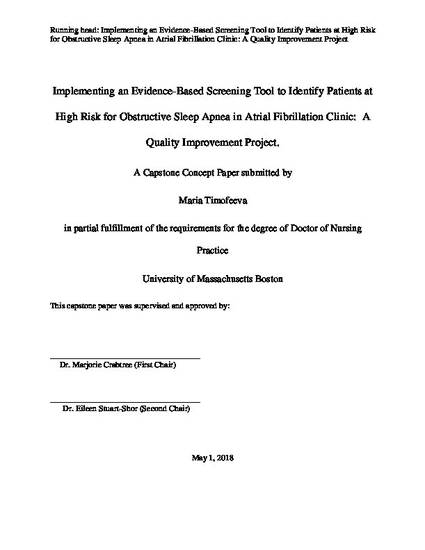
Other
DNP final paper V 7.0 .docx
(2018)
Abstract
ABSTRACT
Background: Atrial fibrillation (AF) is the most common cardiac arrhythmia, the incidence of which is growing as the population ages. This disease is a significant cause of mortality and morbidity and is associated with comorbidities such as obstructive sleep apnea (OSA). Current AF treatment guidelines recommend identifying possible reversible causes of AF such as OSA. The Atrial Fibrillation Quality Care Program is an outpatient transition clinic designed to provide individualized evidence-based care to patients with a new diagnosis of AF. A lack of consistency in screening for OSA was found to be present in this outpatient clinic. This project aims to increase Atrial Fibrillation Quality Care Program’s adherence to guidelines by improving the current screening process for OSA.
Methods: Three models/frameworks were used to guide this project: The Atrial Fibrillation Integrated Care Model, Promoting Action on Research Implementation (PARiHS) framework, and Deming’s PDSA cycle.
Interventions: In order to improve screening for OSA in the Atrial Fibrillation Quality Care Program, two main interventions were conducted: (1) an evidence-based screening tool for OSA was selected and implemented as part of the standard Atrial Fibrillation Quality Care Program consultation; (2) a new triage system for Atrial Fibrillation Quality Care Program patients was adopted by pulmonology.
Results: The implementation of an evidence-based screening tool resulted in 166.0% increase in the screening for OSA at Atrial Fibrillation Quality Care Program. After implementation of the evidence-based tool, 69.6% of the screened patients were identified as high risk for OSA (versus 60.0% prior to using the tool). Of the high risk patients, 97.5% were referred to an in-house pulmonologist (versus 100.0% prior to using the tool). The new triage system reduced the mean number of days to the initial consultation with pulmonologist by 35.2%.
Conclusion: The implementation of an evidence-based screening tool for OSA improved the identification of patients at risk for OSA in Atrial Fibrillation Quality Care Program. The new triage system shortened wait times and enhanced access to OSA treatment by pulmonologist, hence reducing the gap between guideline-adherent care and current clinical practices.
Keywords
- OSA,
- AF,
- screening for OSA
Disciplines
Publication Date
Spring May 1, 2018
Citation Information
Maria Timofeeva. "DNP final paper V 7.0 .docx" (2018) Available at: http://works.bepress.com/maria-timofeeva/1/